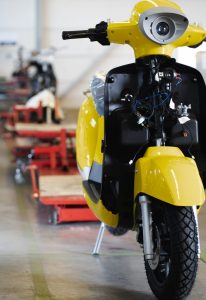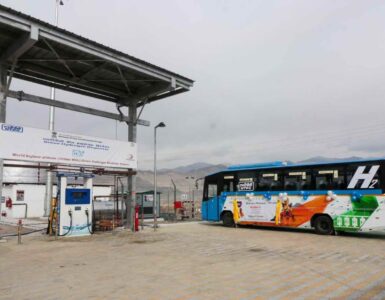Electric vehicle (EV) production in India has seen a steady rise in the last 4-5 years across all segments – electric two-wheeler (e-2W), e-three-wheeler (e-3W), passenger vehicles and commercial vehicles.

In FY2024, the total annual production of electric vehicles was 1.68 million compared to 1.199 million in FY 2023 and 0.462 million in FY 2022. Between April 2023 to March 2024, total electric two-wheeler production was 948,420, followed by e-3W at 632,780, electric passenger vehciles at 92,170 and commercial vehicles at 8,660.
The overall electric vehicle pie is dominated by electric two-wheelers, followed by e-3W and passenger vehicles.
The government of India, through its Ministry of Heavy Industries, has formulated various schemes for strengthening India’s electric Vehicle ecosystem by supporting local manufacturing and providing initiatives to increase the production of EVs in India.
PM Electric Drive Revolution in Innovative Vehicle Enhancement (PM E-DRIVE) Scheme
In September 2024, the PM E-DRIVE Scheme was launched for the promotion of electric mobility and to reduce the dependence on fossil fuels in the country. The scheme has an outlay of Rs. 10,900 crore over two years from 01.04.2024 to 31.03.2026.
The Electric Mobility Promotion Scheme (EMPS) 2024 implemented for 6 months, from 01.04.2024 to 30.09.2024, is subsumed in the PM E-DRIVE Scheme.
This scheme aims to incentivise the sale of e-2W, e-3W, e-Trucks, e-Ambulances, and e-buses. The scheme also supports the development of charging infrastructure and upgrading testing agencies over two years, i.e. up to FY 2025-26.
Production Linked Incentive Scheme for Automobile and Auto Component Industry (PLI-Auto)
PLI-Auto Scheme was launched in September 2021, to enhance India’s manufacturing capabilities for Advanced Automotive Technology (AAT) products with a budgetary outlay of Rs. 25,938 crores for a period of 5 years.
The scheme proposes financial incentives to boost domestic manufacturing of AAT products with a minimum of 50 per cent Domestic Value Addition (DVA) and attract investments in the automotive manufacturing value chain.
Production Linked Incentive (PLI) scheme for manufacturing Advanced Chemistry Cells (ACC)
The government in May 2021 approved the PLI scheme for Advance Chemistry Cells to promote the manufacturing of ACC in the country with a budgetary outlay of Rs. 18,100 crores.
The scheme aims to reduce the dependency on imported ACC in India and establish a competitive domestic manufacturing ecosystem for 50 GWh of ACC batteries.
Faster Adoption and Manufacturing of Hybrid and Electric Vehicles (FAME) scheme
Faster Adoption and Manufacturing of (Hybrid &) Electric Vehicles in India (FAME-India) Scheme was launched to promote electric mobility through demand incentives for electric vehicles. The first phase of the scheme was initially approved for 2 years, commencing from 1st April 2015.
After the successful implementation of the scheme, the second phase i.e. FAME-II was launched in April 2019 with an outlay of Rs.11,500 Crore to provide incentives for electric vehicles including two, three, four-wheelers, electric buses and also EV public charging stations (PCS).
Implemented for 5 years, under the FAME India scheme Phase-II, the Phased Manufacturing Programme (PMP) was introduced with the objective of domestic manufacturing of electrical vehicles, its assemblies and sub-assemblies and parts and sub-parts thereby increasing the domestic value addition.
As of October 31, 2024, a total of Rs.8,844 crore has been spent, including Rs 6,577 crore for subsidies, Rs 2,244 crore for capital assets, and Rs.23 crore for other expenses.
In total 16.15 lakh EVs have been incentivized, which include 14.27 lakh e-2Ws, 1.59 lakh e-3Ws, 22,548 e-4Ws, and 5,131 e-buses. Additionally, 10,985 EV PCS have been sanctioned, with 8,812 allocated for installation.
PM e-Bus Sewa-Payment Security Mechanism (PSM) Scheme
This Scheme was notified in October 2024 with an outlay of Rs. 3,435.33 crore and aims to support the deployment of more than 38,000 electric buses.
The objective of the scheme is to provide payment security to e-bus operators in case of default by Public Transport Authorities (PTAs).
Scheme for Promotion of Manufacturing of Electric Passenger Cars in India (SPMEPCI)
This scheme was notified in March 2024 to promote the manufacturing of electric cars in India.
This requires applicants to invest a minimum of Rs. 4,150 crore and to achieve a minimum DVA of 25 per cent at the end of the third year and a DVA of 50 per cent at the end of the fifth year.
Other Incentives and Schemes
In 2019, the Finance Ministry of the government reduced GST on electric vehicles in India from 12% to 5%. The reduced taxes will make owning an EV much more affordable for consumers.
In 2021, the MoRTH has also formulated the Vehicle Scrapping Policy for the creation of an ecosystem to phase out older and polluting vehicles across the country in favour of potentially electric vehicles.
Wrapping Up
Battery-operated vehicles are given green licence plates in India.
In the last few years, the Government of India has been actively working to increase the number of vehicles with green number plates and revolutionize India’s electric vehicle ecosystem.
Through electric vehicles, the government can address many other concerns like climate change, environmental pollution and fuel security. In addition, investment in the EV sector and associated supply chain can create significant employment opportunities along the value chain.
However, much needs to be desired, as the adoption of electric two-wheelers is just about 1 per cent and electric four-wheelers is 0.32 per cent. Much of this is due to factors like range anxiety, charging infrastructure and availability.
Therefore, if the government wants to transform India’s electric vehicle ecosystem, in addition to schemes and policies, attention should be given to creating awareness campaigns and addressing consumer concerns.






Add comment